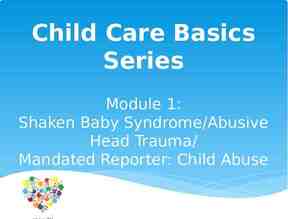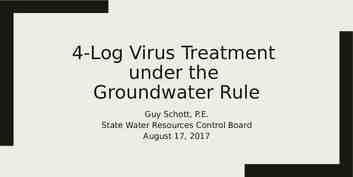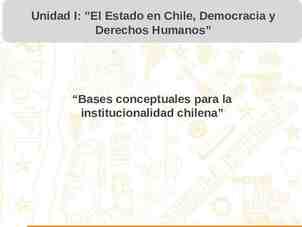Introduction to ICD-9-CM
46 Slides649.00 KB

Introduction to ICD-9-CM

Objectives Review the layout of the ICD-9-CM Understand conventions Master the code look-up process Discuss Official ICD-9-CM Coding Guidelines

Introduction to ICD-9-CM International Classification of Disease, Ninth Revision, Clinical Modification – Modified for use in the United States – Describes in detail the patients’ condition Uses – Statistical aggregation within populations – Reporting medical necessity to insurers

Look at Your Code Book Find these features –Volume 1 –Volume 2 –Coding Guidelines

Medical Necessity Rhinoplasty: nose job –Repair an injury? –Improve cosmetic appearance? Was the service covered under the patient’s medical policy? Is the service medically necessary?

ICD-9-CM Coding Conventions Rules to make lookup more efficient

Index: History (Personal) History (personal) of abuse emotional V15.42 neglect V15.42 physical V15.41 sexual V15.41 affective psychosis V11.1 alcoholism V11.3 specified as drinking problem (see also abuse, drugs, nondependent) 305.0x

Index: History (Personal) failed conscious sedation V15.80 moderate sedation V15.80 falling V15.88 family allergy V19.6 anemia V18.2 arteriosclerosis V17.49

Index: History (Personal) failed conscious sedation V15.80 moderate sedation V15.80 falling V15.88 family allergy V19.6 anemia V18.2 arteriosclerosis V17.49

NEC vs. NOS NEC Not elsewhere classifiable “We know what’s wrong, but there isn’t a specific code for it.” NOS Not otherwise specified “We aren’t sure what’s wrong.”

Punctuation [ ] Brackets: in tabular enclose synonyms or alternate wording Example: 521.7 Intrinsic posteruptive color changes Staining [discoloration] of teeth [ ] Slanted brackets: in index identifies manifestations and indicates sequence. Example: Diabetes gangrene 250.7x [785.4]

Punctuation ( ) Parentheses: enclose supplementary words that may be present in the description Example: Blindness (acquired)(congenital)(both eyes)

Additional Terms 232 Carcinoma in situ of skin Includes Excludes pigment cells melanoma in situ of skin (172.0-172.9) 232.5 Skin of trunk, except scrotum Anus, margin Axillary fold Perianal skin Skin of: abdominal wall

“Use additional code” Diabetes gangrene 250.7x [785.4] 250.7 Diabetes with peripheral circulatory disorders Use additional code to identify manifestation, as: diabetic gangrene (785.4) peripheral angiopathy (443.81)

“Code first” 422.0 Acute myocarditis in diseases classified elsewhere Code first underlying diseases, as: myocarditis (acute): influenzal (487.8, 488.09, 488.19) tuberculous (017.9)

Use Additional Code 692.3 Contact dermatitis due to drugs and medicines in contact with skin Use additional E code to identify drug

Use Additional Code, if Applicable 571.5 Cirrhosis of liver without mention of alcohol Code first, if applicable, viral hepatitis (acute) (chronic) (070.0-070.9)

Combination Codes Single codes: 780.52 Insomnia, unspecified 780.57 Unspecified sleep apnea Combination code: 780.51 Insomnia with sleep apnea, unspecified

Steps to Look Up a Diagnosis Code Find the documented diagnosis Determine the main term Look up the main term in the Index to Diseases (Volume 2) Find the code in the Tabular List (Volume 1) Read all notes associated with the code

Main Term What is the: – disease? – illness? – symptom? Example: – Acute purulent viral bronchitis – Severe unremitting pain in the right leg

What’s the Main Term? Ruptured ovarian cyst Decubitus ulcer of the right heel Congenital absence of ear lobe Febrile convulsions

What’s the Main Term? Ruptured ovarian cyst Decubitus ulcer of the right heel Congenital absence of ear lobe Febrile convulsions

Code Lookup Locate term in index Note code associated with chosen index entry Lookup code in tabular section Tabular section – 17 chapters – Chapters have 3-digit categories – Categories have 4- or 5-digit subcategories

Specificity 123 M&Ms 1 Chocolate filled 2 Peanut filled 1 Red 2 Blue 3 Yellow 4 Green 5 Brown 9 Unspecified 123.2x M&M; Peanut filled 123.11 M&M; Chocolate filled; Red 123.23 M&M; Peanut filled; Yellow

Scientific Classification Chapter: Overarching scientific classification: CANDY Three-digit category within chapter: M&M Four-digit category within chapter: PEANUT Five Digit category: RED

Ankle fracture vs AIDS 824 Fracture of ankle 824.0 Medial malleolus, closed 824.1 Medial malleolus, open 824.2 Lateral malleolus, closed 824.3 Lateral malleolus, open 824.4 Bimalleolar, closed 824.5 Bilmalleolar, open 824.6 Trimalleolar, closed 824.7 Trimalleolar, open 824.8 Unspecified, closed 824.9 Unspecified, open 042 AIDS

Scientific Classification Chapter: Signs and Symptoms 788 Symptoms involving urinary system 788.3 Urinary incontinence 788.32 Stress incontinence, male

Complicated Open Wound of Nasal Sinus Chapter: Injury and poisoning 873 Other open wound of head 873.3 Nose, complicated 873.33 Nasal sinus

Acute Arthritis Arthritis, arthritic (acute) (chronic) (subacute) 716.9 meaning Osteoarthritis – see Osteoarthrosis Note: 0 1 2 3 4 5 6 7 8 9 5th Use the following fifth digit subclassifications with categories 711-712, 715-716 site unspecified shoulder region upper arm forearm hand pelvic lower leg ankle and foot other specified sites multiple sites

Acute Arthritis 5th 716.9 Arthropathy, unspecified [0-9] Arthritis (acute) (chronic) (subacute) Arthropathy (acute) (chronic) (subacute) Articular rheumatism (chronic) Inflammation of joint NOS

Acute Arthritis The following fifth-digit subclassification is for use with category 716; valid digits are in [brackets] under each code. See the list at beginning of chapter for definitions. 0 site unspecified 1 shoulder region 2 upper arm 3 forearm 4 hand 5 pelvis region and thigh 6 lower leg 7 ankle and foot 8 other specified sites 9 multiple sites
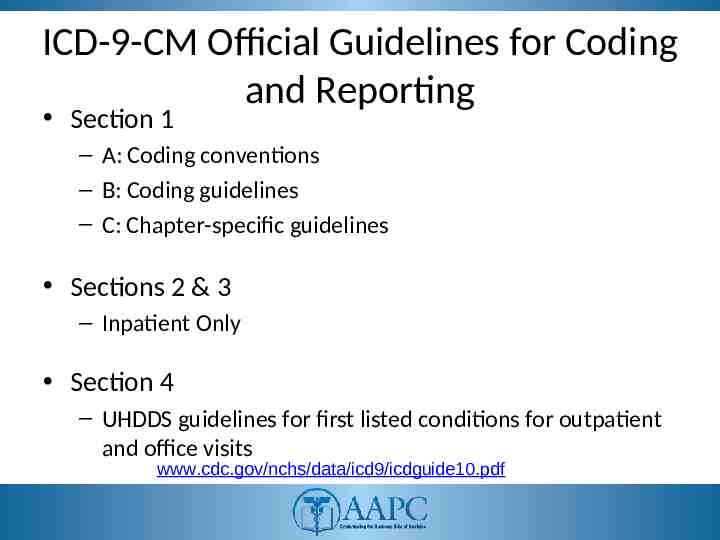
ICD-9-CM Official Guidelines for Coding and Reporting Section 1 – A: Coding conventions – B: Coding guidelines – C: Chapter-specific guidelines Sections 2 & 3 – Inpatient Only Section 4 – UHDDS guidelines for first listed conditions for outpatient and office visits www.cdc.gov/nchs/data/icd9/icdguide10.pdf

ICD-9-CM Guidelines Hierarchy of Rules 1. Always follow instructions within ICD-9-CM that are specific to the code. 2. Follow chapter or section instructions when they do not conflict with the individual code instructions. 3. Follow guidelines when they do not conflict with the chapter, section, or individual code instructions.

ICD-9-CM Guidelines Inpatient hospital – “Hospitality:” nursing care, bed, OR, tests, meds Payment for level of “hospitality” required Outpatient physician – Surgical procedures and office visits Payment for services rendered
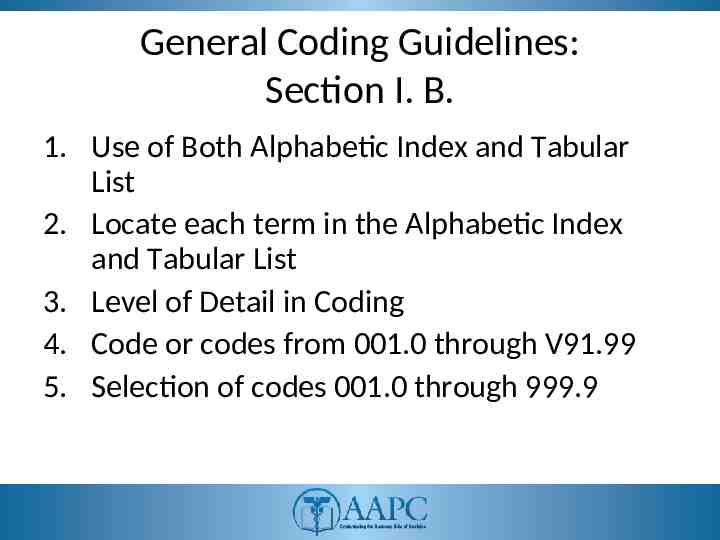
General Coding Guidelines: Section I. B. 1. Use of Both Alphabetic Index and Tabular List 2. Locate each term in the Alphabetic Index and Tabular List 3. Level of Detail in Coding 4. Code or codes from 001.0 through V91.99 5. Selection of codes 001.0 through 999.9

General Coding Guidelines: Section I. B. 6. Signs and symptoms 7. Conditions that are an integral part of the disease process 8. Conditions that are not an integral part of the disease process 9. Multiple coding for a single condition

General Coding Guidelines: Section I. B. 10. Acute and Chronic conditions – – – Acute Bronchitis 466.0 Chronic Bronchitis 491.9 Code both, acute first, then chronic 466.0, 491.9 11. Combination code – – – – Right bundle branch block 426.4 Left bundle branch block 426.3 Other bilateral bundle branch block 426.53 Code only the bilateral bundle branch block 426.53

General Coding Guidelines: Section I. B. 12. Late Effects – – Code first the residual condition of the late effect Code second the cause for the late effect (905.0-909.9) 13. Impending or threatened conditions 14. Reporting same diagnosis more than once – – – Right kidney infection Left kidney infection Report code only once as 590.9 590.9 590.9

General Coding Guidelines: Section I. B. 15. Admissions/encounters for rehabilitation – – V57.1 Other physical therapy 729.2 Neuralgia, neuritis, and radiculitis 16. Documentation of BMI (Body Mass Index) and pressure ulcer stages 17. Syndromes

Section IV: Diagnostic Coding and Reporting Guidelines for Outpatient Services A. Selection of first-listed condition 1. Outpatient surgery 2. Observation stay Exception: Admit for surgery, develops complication, sent to observation: – Reason for surgery is coded first – Complication for observation is coded second

Section IV: Diagnostic Coding and Reporting Guidelines for Outpatient Services B. Codes from 001.0 through V91.99 C. Accurate reporting of ICD-9-CM diagnosis codes D. Selection of codes 001.0 through 999.9 E. Codes that describe symptoms and signs
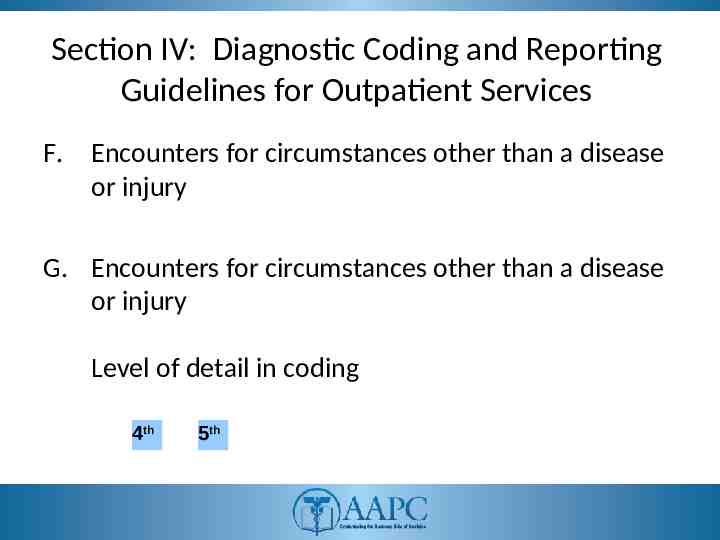
Section IV: Diagnostic Coding and Reporting Guidelines for Outpatient Services F. Encounters for circumstances other than a disease or injury G. Encounters for circumstances other than a disease or injury Level of detail in coding 4th 5th

Section IV: Diagnostic Coding and Reporting Guidelines for Outpatient Services H. ICD-9-CM code for the diagnosis, condition, problem, or other reason for encounter/visit I. Uncertain diagnosis J. Chronic diseases K. Code all documented conditions that coexist

Section IV: Diagnostic Coding and Reporting Guidelines for Outpatient Services L. Patients receiving diagnostic services only M. Patients receiving therapeutic services only – Exception: primary reason for visit is chemotherapy, radiation therapy, or rehabilitation N. Patients receiving preoperative evaluations only

Section IV: Diagnostic Coding and Reporting Guidelines for Outpatient Services O. Ambulatory Surgery P. Routine outpatient prenatal visits

The End


